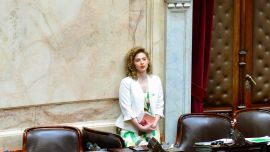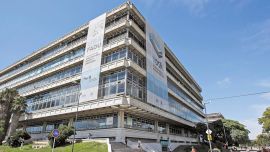Less than a month separates the Argentine electorate from the transcendental PASO primaries. The electorate appears to be living in a paradoxical moment of euphoria, with a boom in financial assets and consumption, while the country teeters on the verge of default and potential hyperinflation. This fractured reality is both cause and consequence of the extreme levels of uncertainty generated by the complicated macroeconomic situation of the nation and the breakdown of the hegemony of the two leading coalitions, which have fractured internally while giving rise to a third competitive political alternative incarnated by ultra-liberal economist Javier Milei. It isn’t clear whether we are living in an Argentina that is on the cusp of a revolution that will see the nation finally thrive or if the weight of its problems are such that even the grace of fortune, filling the land with precious natural resources, will be insufficient to create the “Argentine miracle” that has remained elusive for decades. In that context, Horacio Rodríguez Larreta and Patricia Bullrich are fighting tooth and nail for a spot in the presidential ticket in what is truly a competitive primary, the likes of which the country hasn’t seen in the past few decades, if ever, but which could erode Juntos por el Cambio’s competitive advantage, while Cristina Fernández de Kirchner has allowed Sergio Massa to take the lead in order to avoid a disastrous third place in the general election that will leave Unión por la Patria out of the run-off. Milei, who up until recently was seen as the frontrunner in the individual vote for the primaries, has seen his star begin to fade as accusations of financial foul play pile up against him.
As the first veil of uncertainty was lifted with the formal presentation of the electoral tickets, the situation has become even more complex. Counter-intuitively, the economy minister’s emergence to lead the ticket by displacing colleague Eduardo ‘Wado’ de Pedro (Argentina’s interior minister) gave a massive boost to Unión por la Patria’s voting intentions, despite Massa’s massive levels of public rejection. From a potentially fatal third place, the pan-Peronist coalition is now expected to rake in nearly 30 percent of the vote, according to a poll aggregator put together by political scientist Federico Tiberti from Princeton University. This sudden and unexpected surge is mirrored by the expected voting intention of their main political rivals, Juntos por el Cambio, which could get close to the 35-percent mark through the sum of Rodríguez Larreta and Bullrich’s votes. Milei’s incredible rise to around 25 percent, potentially displacing the Peronists and threatening their capacity to make it to the run-off vote, stalled somewhere between April and May and is now showing a steep decline, potentially falling below the 20-percent line. The libertarian vote, seen as an anti-system reaction by a portion of the electorate that is sick and tired with the political “caste,” along with the blank and undecided vote, and whatever Córdoba Province Governor Juan Schiaretti could scrape, seems to be finding its way back to the leading coalitions as the election draws closer.
Everyone’s fighting a different battle, the most interesting of which can be seen in the opposition coalition. The Buenos Aires City mayor has been preparing for this moment all his life, and appeared as the clear frontrunner. Unexpectedly he found a tough competitor in Patricia Bullrich, the former security minister who was up until recently Mauricio Macri’s placeholder PRO party president. Rodríguez Larreta’s slide in voting intention has thrown his campaign off-balance, moving back from a message of master consensus-builder with the proven experience of running an executive to a combative tough guy who has what it takes to fix the country. It’s not as credible as Bullrich’s message, which touches an anti-Kirchnerite nerve among Juntos por el Cambio’s core voters, along with an image of toughness that is appealing to some of the same people that like Milei. She’s already garnered the support of an important sector of the business elite and has begun to behave like the future president of the country, toning down her rhetoric. It remains to be seen whether Rodríguez Larreta, who counts with the advantage of controlling the City government’s communications machine, can pull a proverbial rabbit out of the hat or whether he’ll have to succumb to his internal rival.
That struggle is intimately tied to what Massa and Unión por la Patria are facing. For months they’ve been suspected of propping up Milei’s campaign, particularly in the Buenos Aires Province, in order to debilitate Rodríguez Larreta, seen as a tougher opponent in a potential runoff than Bullrich. Massa had to jump through the Peronist hoops to knock-down the ‘Kirchnerite’ ticket, which was formally announced but never acknowledged by Fernández de Kirchner, the true seat of power. She quickly handed over her protégé’s head on a plate, giving Massa and nemesis Alberto Fernández their picks on the presidential ticket, while keeping for herself the leading spots in the legislative lists, including runs for Wado and son Máximo in the Senate and Chamber of Deputies representing Buenos Aires Province, respectively.
After having received Cristina’s blessing, Massa needs to demonstrate that his tenure at the Economy Ministry hasn’t been an all-out disaster. After failing to control inflation, he’s seen two consecutive months of declines. June’s figures, the last before the PASO, show a slowing of price increases to six percent, the “lowest” figure since January but well above the monthly three percent promised last year. The Central Bank has effectively run out of hard currency and is thought to be using deposits to face obligations as Massa’s team negotiates a new round of programme exemptions and disbursements with the International Monetary Fund. The economy, which Massa supposedly controls, is contracting, meaning he will have to face a situation of his own making in a tough campaign. The expectation, though, was never to win.
Milei also appears to be fighting a battle wth the consequences of his own actions. He saw his voting intention rise from scratch to some 25 percent in just a few years, potentially displacing the Peronists and giving his followers the hope that he could make it to the Casa Rosada. He’s plummeted since as accusations his party are selling spots on the lists have mushroomed. It’s an unspoken truth in the Argentine political system that it is impossible to run a presidential campaign within the limits of the law. Even the supposed anti-corruption activists within Juntos por el Cambio have had to deal with dark money. Now, Milei is in the spotlight for what his advisors apparently did in order to construct a national liberal coalition that could present candidates in every province and municipality. Selling spots on the lists for thousands of dollars and even sexual favours, which is what they are being accused of, doesn’t look good for Milei less than a month from the election. He looks too much like the “caste” he wants to eliminate. In the same way that his ascent seemed exaggerated, his fall from grace appears excessive, as has his support from certain sectors of the media — that are also said to be monetising their spotlight in the heat of the electoral season — has waned.
The clock is ticking and the Argentine paradox is becoming more explicit than ever, making the political rate race extremely uncertain, and interesting.






















Comments